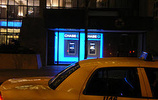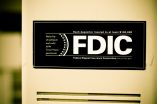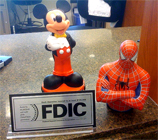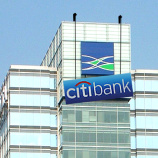Just when we though the financial crisis might be over…or starting to be over, at least…came two more bank failures today. The larger one was Colonial BancGroup of Montgomery, Alabama. Colonial is the sixth largest bank failure in American history. The FDIC swooped in to save the day, and competitor BB&T will buy the bank’s assets.
fdic

WaMu/Chase Doesn't Believe Your Card Was Stolen, Despite The Fact That The Thief Was Arrested
Reader Stephen says that a NYC Taxi driver tricked him into using an ATM skimmer-like-device instead of the normal credit card machine and made off with his card and PIN. The NYPD made an arrest, but Stephen says he’s still battling with Chase/WaMu.

Ally Bank Delivers Lower CD Rates Than Promised; Also No Pony
A few weeks ago, we posted about the rebranding of and promising new start for Ally Bank, formerly GMAC. But one new customer isn’t very enthusiastic about their services.

How The FDIC Is Funded
So you know that the Federal Deposit Insurance Corporation (FDIC) protects your money in deposit accounts at FDIC insured institutions up to $250,000, but have you ever wondered how they pay for it?

FDIC $250,000 Insurance Limit Extended to 2013
This week, President Obama signed a law that includes provisions that extend the $250,000 FDIC & NCUA deposit insurance limit to December 31st, 2013.

How to Confirm FDIC or NCUA Insurance
More and more local banks are turning to the internet to entice deposits, offering high yields and favorable loans terms. But how do you know if a bank is legit? Ask the FDIC.

../../../..//2009/03/21/the-nations-banks-lost-a/
The nation’s banks lost a staggering $32.1 billion in the final three months of 2008, according to the FDIC. [AP]

Get $50 Million In FDIC Insurance
You read the title right. When you’re a high roller, the $250,000 limit of FDIC insurance just isn’t going to cut it. Let me show you how you can get $50 million. It’s all about rocking the CDARS.

Banks Didn't Pay Into FDIC Coffers From 1996 To 2006
For 10 years—including the boom times banks enjoyed in the first half of this decade—the FDIC was prevented from collecting fees from 95% of financial institutions, which it would have used to further build up its safety net in the event it would someday have to bail out a bunch of stupid losers who confused banking with alchemy.

FDIC Criticizes Banks' Overdraft Fees
It took 18 months for the FDIC to figure out that banks’ practice of clearing checks largest to smallest makes banks a lot of money.

../../../..//2008/11/18/are-you-so-loaded-that/
Are you so loaded that you exceed the FDIC’s guarantee limit for deposits? Consider the Certificate of Deposit Account Registry Service. Deposit the funds at one of 2,500 CDARS member banks and they’ll automatically spread your cash among other member banks as needed to stay within FDIC coverage limits. Kiplinger says, “You’ll earn one rate (set by the home bank) and get one statement and one form at tax time.” [Kiplinger]

Treasury, FDIC Considering Plan To Guarantee Millions Of Mortgages
The Washington Post says that the Treasury Department and the FDIC are considering a plan to guarantee millions of mortgages. According to the WaPo, the plan under consideration would encourage lenders to reduce borrowers monthly payments based on the homeowner’s ability to pay. To attract lenders into the program, the government would guarantee to repay the lender for a portion of its loss if the borrower defaulted on the reconfigured loan.

US Muses Backing All Deposits, No Deposit-Insurance Ceiling
In order to stem the tide of panic-stricken morons taking out all their cash from banks and further destabilizing the financial system, the US is considering a proposal to completely back ALL deposits. This would mean that there would be no deposit insurance ceiling. So even if you had more than $100,000 in the bank, even if you had $1,000,000 in the bank, the government would give you back ALL of that money if your bank failed. The proposal is only in discussions right now, and several different agencies would have to agree that there was “systemic risk” in order to enact it. Europe has already guaranteed all deposits, however, and in order to keep large corporate accounts from emigrating overseas, the US may be forced to follow suit within a few weeks.

Wells Fargo Wins, Will Buy Wachovia
Wells Fargo is the winner in the battle for Wachovia, says the New York Times. Apparently, Citibank became nervous about splitting the bank when they saw the size of the “bad assets” it would have to take on, and quietly walked away. The bank will continue to seek $60 billion in damages, however.

What Does The Bailout Mean For You?
So, Congress finally passed the bailout bill. You know about the Treasury’s newfound $700 billion, and you’ve heard about the snipped golden parachutes, but what does the 451-page week-old shotgun savior of a bill actually mean for you?

Not So Fast: Judge Blocks Wachovia Sale To Wells Fargo, Citibank Rejoices
Tsk tsk, Wells Fargo. You should’ve known that stealing Citibank’s unspoiled bride at the alter was going to draw a bitter legal challenge. Late last night, Citibank’s team of repo-lawyers claimed a partial victory, announcing that a New York judge has agreed to block Wachovia’s sale. Citibank is also demanding $60 billion from Wells Fargo for interfering with the deal.
../../../..//2008/10/01/word-is-sovereign-bank-and/
Word is Sovereign Bank and National City Corp are “next on the FDIC’s to-do-list.” [Clusterstock]

Citigroup Buys Wachovia
Part of Wachovia will remain independent — including its massive brokerage business which ballooned after it purchased AG Edwards in 2007, as well as its Evergreen investment management division.


